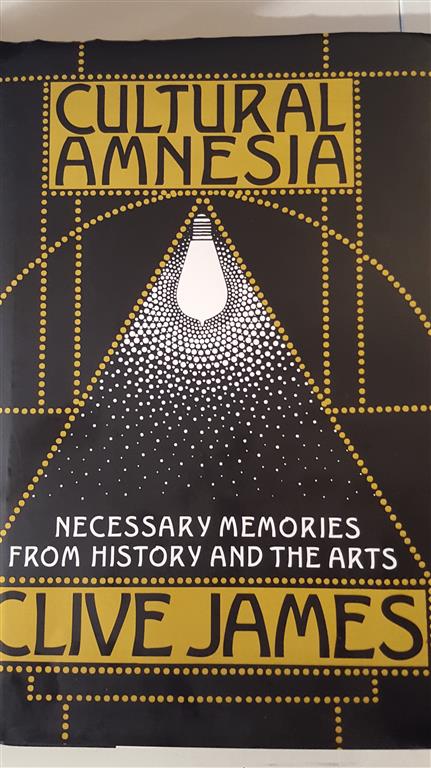I came late to the table of Clive James’ banquet of cultural insights, reading a review of his Cultural Amnesia in the summer of 2019 and then feasting on the book in early fall. It is indeed laden with rich food for thought, beginning with “Anna Akhmatova”, who James writes “was the most famous Russian of her time, but the time was out of joint”; he continues through the alphabet of interesting and/or famous people to conclude with “Stefan Zweig”, who James writes “his life, work, exile and self-inflicted death combine to sum up so much of what has gone before, which is really the story of the will to achievement in the face of all the conditions of despair.” (my italics)
It really is a book to read leisurely, savouring each person’s story. But in our postmodern era when a good writer is hard to find, I devoured all 850 pages as if they’d be snatched away before I got to finish the banquet. Of the 106 portraits James creates, I was well or somewhat acquainted with about half of them; the other half I had never heard of, but was always interested—sometimes more, sometimes less—in what James had to say about them and understood why he chose to include them. “My heroes and heroines are here,” James writes, but also his ‘”intellectual bêtes noires”, which include the super-villains Hitler, Stalin & Mao. Many of his heroes and heroines are mine, too, and the super-villains are universal fact with no opinion involved.

Clive James died November 24, 2019. I mourn the passage of a cultural critic par excellence, and offer this tribute to him accompanied by a fervent recommendation to read Cultural Amnesia—a truly good book.
To find out we are not infallible, we read and we read and we read. Free societies exalt reading; totalitarian states proscribe it, telling citizens what they can read and what they cannot. What totalitarians, both regimes and individuals, hate is “the bewildering complexity of civilized life”, and will always try to organize, categorize people into groups they can manage and manipulate. A perfidious example of this today is the progressives’ rabid support of identity politics, penning humans into grievance groups with impenetrable walls of separation. In stark rebuke, James invites us to the cultural conversation, which is richer, deeper and more accessible now than it has ever been in human history: “Technology has not only given us a permanent present, but has given it the furniture of eternity.”
Now to the banquet.

Raymond Aron (1905-1983). Aron wrote The Opium of the Intellectuals in defence of liberal democracy, while his contemporary Jean-Paul Sartre was proving Aron’s point by extolling communism to the hallelujah chorus of most of the intellectual class.

For those of us who believe that the alternative “to getting everything brazenly wrong” is “to get a few things modestly right”, Aron remains a guide in the thickets of Marxist thought clogging up intellectual discourse. His respect for fact keeps “his prose permanently fresh” and keeps him from sinking into the utopian dreams of the pontificating leftists. It was fact that led him to conclude “that mutually assured destruction would be the only possible guarantee against disaster” in the Cold War between the US and USSR in the latter half of the 20th century.
As a corollary of this, I have come to the conclusion that pacifists, Ban the Bomb protesters prominent among them, are parasites on the body politic. I agree with Winston Churchill that it is better to jaw-jaw than to war-war, but when tyranny approaches, a citizen of a liberal democracy has no option but to fight that tyranny. Everything else is secondary.
Walter Benjamin (1892-1940). From the lucid prose of Aron, we plunge into the academese of Benjamin. “Clever always, he was clear seldom: a handy combination of talents for attaining oracular status.” The university-studies programs are rife with this prose, which is almost a necessary qualification to teach in the humanities. While the DNA of studies courses is junk, it is sad to see so much of the humanities—the origin of Western universities—is junk, too, with its left slant becoming almost prone.
Needless to say, the intellectuals lapped up Benjamin’s defence of Marxism, equating profundity with its obscurity. “There is no arguing against an all-inclusive obscurity except to say that the whole thing means nothing, which few of us dare to do.” Especially intellectuals, who dare to do nothing to impede their tenure track. They deserve the opposite of Winston Churchill’s praise of the RAF in WWII, “Never in the field of human conflict was so much owed by so many to so few.” Which for intellectuals should read, “Never in the field of human politics were so many deaths (by communism) owed to so few (the elites ensconced in their ivory towers).” Intellectuals have been seduced by communism from its Marxist birth to its ongoing prison states—from bloody revolutions to impose its tyranny, to the killing fields that ebb and flow to ensure its survival, to its continuing brutal control of the country’s populace.

Jean-Paul Sartre (1905-1980). And then we have Sartre who towers over Benjamin in his gauchist vision and influence. “A key principle in this vision is that the Communist regimes, no matter how illiberal, had serious altruistic intentions in comparison with the irredeemably self-serving capitalist West.” And academics in the West, atheists almost to a man, bowed in reverence to this tenet of faith. They proved to be better missionaries than the Christian missionaries as they proselytized the communist dogma to their students in universities throughout the West. Sartre’s arguments had “a knack for making duplicity look profound”, which was emulated in the arguments of his acolytes. Prominent among these acolytes are Michel Foucault and Jacques Derrida. What Sartre preached in the first part of the 20th century, Foucault and Derrida continued his sermon, obfuscating their way into lefties’ hearts & minds.
James speculates that Sartre’s overwhelming desire to be extraordinary among ordinary mortals may have been the motivation to become “the most conspicuous single example in the twentieth century of a fully qualified intellectual aiding and abetting the opponents of civilization.” In his quest to stand above the crowd, his mental acuity had to be his primary weapon because a bad eye and ugliness wiped out any physical assets. Ironically, his fame overcame his physical ugliness, with women groupies scrambling to sleep with him, and he obliging, of course. “Like Robespierre, he had an awful purity,” James concludes, a fittingly damning description and a fitting placement in the West’s Hall of Infamy.

But no matter how Sartre tried to obscure his perfidy in WWII with a blizzard of words, it is there to see for anyone who reads this inglorious chapter of French collaboration with the Nazis. Not only did Sartre do nothing to oppose the Nazis, he continued his career as a writer and philosopher during their occupation of Paris, pontificating in the cafes on the Left Bank as the Nazis rounded up the Jews and put them on the trains to the concentration camps. “No more issue was ever more inescapably real; even the cost of ignoring it was measurable in lost lives; there could be no philosophical discussion of any subject on which that subject did not intrude.” Then Sartre topped his dish of cowardice with a large scoop of calumny by claiming he had fought in the Resistance! “He pretended that he had been brave: the single most shameful thing a man can do when other men have been brave and have paid the price.”
British – G.K. Chesterton (1874-1936). A writer, philosopher, lay theologian, and literary & art critic, Chesterton’s “…virtue was for asking the awkward questions about current liberal fashions,” James writes. Combine this with his opposition to “state power in any form”, “an abiding suspicion of the cosmopolitan” and his definition of “true democracy as the sum total of civilized traditions”, and—voilà—we have the definition of a conservative. Chesterton was a prodigious man with a prodigious output, writing many books of prose—fiction & nonfiction—and poetry. “He wrote a lot faster than most of us can read,” James writes, and his motto was:
To set a measure to praise and blame, and to support the
classics against the fashions.
The first part is embedded in all writers of criticism. As James writes, “Praise and blame are aspects of the same thing. The capacity for criticism is the capacity for enjoyment.” The second part speaks to Chesterton’s building on the traditional to create his new discourse, be it the Father Brown stories, his poetry or his criticism, rather than throwing out the old to replace it with the latest fad. Again, conservative to the core.

After belabouring a great many people for a great many years for being unprogressive, Mr. Shaw has discovered, with characteristic sense, that it is very doubtful whether any existing human being with two legs can be progressive at all. Having come to doubt whether humanity can be combined with progress, most people, easily pleased, would have elected to abandon progress and remain with humanity. Mr. Shaw, not being easily pleased, decides to throw over humanity with all its limitations and go in for progress for its own sake. If man, as we know him, is incapable of the philosophy of progress, Mr. Shaw asks, not for a new kind of philosophy, but for a new kind of man. It is rather as if a nurse had tried a rather bitter food for some years on a baby, and on discovering that it was not suitable, should not throw away the food and ask for a new food, but throw the baby out the window, and ask for a new baby. (Heretics)

French – Gustave Flaubert (1821-1880). As I wrote in Blog #48, my appreciation for Flaubert’s writing deepened when I reread Madame Bovary some 60 years after reading it for the first time. So many changes have happened in that span from teenager to old woman, but human nature not so much. Vain and shallow women, and men, remain part of the population, probably in much the same proportion of the living population as they always have. Madame Bovary is a novel that proves, James writes, “that a living work of fiction is a vision of what the world is, and not just of what the author thinks society should be.”
In contrast to Chesterton’s ‘writing faster than most of us can read’, Flaubert wrote slowly and labouriously, revising and revising and revising. In contrast to Chesterton’s strong Catholic faith, Flaubert distained all gods and believed that a golden moment in human history was between the death of paganism and the birth of Christianity:
No cries, no convulsions, nothing more
than a face fixed in
thought. The gods no longer existed,
Christ didn’t exist
yet, and there was, from Cicero to
Marcus Aurelius,
a unique moment in which man was
alone.
(In an 1861 letter to Mme. Roger du Genettes)
But, as James writes, “man had no refuge from the judgement of his fellow man. You can’t be less alone than that. A society in which all the pressures are social is the one dreamed of by totalitarians.” This is where James and I part ways: He blames religion for the tyrannical hold over man Christianity had as it rose in power and influence since Christ’s birth; I see the gargantuan piles of bodies stacked up in the communist states of the 20th century—piles that dwarfed those of all the preceding 19 centuries. It seems to me that all godless roads lead to tyranny of one sort or another, with today’s progressives trying hard to turn our liberal democracies into communist hellholes.
American – F. Scott Fitzgerald (1896-1940). The Great Gatsby is “one of the prophetic books of the twentieth century. Fitzgerald guessed where celebrity, if pursued for itself, was bound to end up: as a dead body in the swimming pool,” James writes. It’s a haunting book that speaks directly to our time and its worship of celebrity. Why anyone would be influenced by a celebrity’s opinion on anything other than his tiny little area of fame is mindboggling. Why anyone would care what Robert de Niro, a singularly stupid person, thinks about the president of the United States is discouraging. Why anyone would spend a nickel of her hard-earned money on Gwyneth Paltrow’s Goop garbage is shocking. But they do. And many a celebrity ends up dead in a swimming pool, but not before they do damage to so many naïve people with their leftie nonsense.
The tragedy is that Fitzgerald pursued what he so eloquently wrote about. Perhaps that’s why his stories are so powerful: He was living them as he was writing them. He could see the fakery and superficiality of the ‘beautiful people’, but he couldn’t resist their siren call and succumbed to their seduction—a seduction that led to his latter years eking out a living as a Hollywood screenwriter and dying at 44. James concurs that you can’t have the superb writing without the person Fitzgerald was: “his disaster robbed us of more books as wonderful as The Great Gatsby and Tender Is the Night, but we wouldn’t have those if he hadn’t been like that. Fitzgerald’s prose style can be called ravishing because it brings anguish with its enchantment…The style was the man.”

Promise & loss
Egon Friedell (1878-1938). This was someone I had never heard of, but was immediately intrigued because he was part of the MittelEuropean group that dominated the era, “an era, with all its promise of a just world, and the despair of that world cruelly lost”, James writes. Their wit and intelligence was nurtured in the café society of Vienna in the early part of the 20th century. And it was dominated by Jews.

Wit was taken for granted “when everyone was a famous talker… But really it can’t be confined to the cafés: in the whole culture right through until the Nazis turned out the lights, talk was a way of being, and it was universally understood that the best talkers had the right to talk it all away… For more than forty years in Vienna, talk was a way of life, and then it ended.”
And Friedell captured that erudition in his three-volume set of Cultural History of the Modern Age, along with his unfinished companion piece Cultural History of the Ancient World. They became refugees’ essential books as they fled Nazi Germany to all points of the world. But his circle’s vision that the historical accumulation of knowledge leads to a sensible society evaporated in the depravity of Nazism, and he jumped to his death when he anticipated his inevitable arrest after the Anschluss.
“…the more indispensable to culture they became, the more they were resented.” That’s when Hitler and his thugs moved in, scrapping the lustre from German culture and replacing it with the dull dross of Nazism. Friedell and his cohort saw the menace from Hitler and his cohort—“people prone to catch-all theories”—but thought that the Christian German civilization would not succumb to their evil. But Nazism co-opted Christianity. “The mark of sentimentality it is to be all choked up with feeling about nothing, and the mark of the black-and-silver ceremonial (a Nazi appeal to spiritual values of chivalry) was to upgrade sentimentality to the religious plane by working towards a future in which nostalgia for the supposed purities of the heroic past world become real.” Hitler was full of sentimentality and nostalgia. The moral: Beware of sentimentality. Beware of nostalgia
Cultural knowledge is essential
After this taste of Clive James’ cultural banquet, I hope I’ve whetted your appetite for more. We’ve only nibbled at seven of them, with 99 more to read through James’ eyes and then ponder his assessment. Some will be an introduction, leaving you hungry to learn more about them; others will be just an interesting encounter in your reading life. Regardless, every one of them has had an influence on our lives, and it is crucial that we citizens of the free world understand that influence to support the good and stop the evil.
We are at a moment in our lives, the COVID-19 pandemic, that bears some resemblance to the 1930s and the lead-up to WWII. Like then, the times bring out the best and the worst in people. The willingness to follow sensible instructions, such as social distancing and washing one’s hands often, is responsible behaviour that should be encouraged. The willingness to enforce overbearing rules & regulations, such as snitching on your neighbour or encouraging children to admonish their parents, is tyrannical and must be resisted and exposed. A horrible example of the latter is the thuggish reaction by the police to the two Albertans at the Alberta Legislature peacefully protesting the government overstepping its authority in its demands during the pandemic. This is how it starts, with some politicians and some police becoming intoxicated with power, and we, the people, not immediately reining them in.
Cultural knowledge is essential for liberal democracies to flourish. Cultural amnesia, like a virus, kills them.

